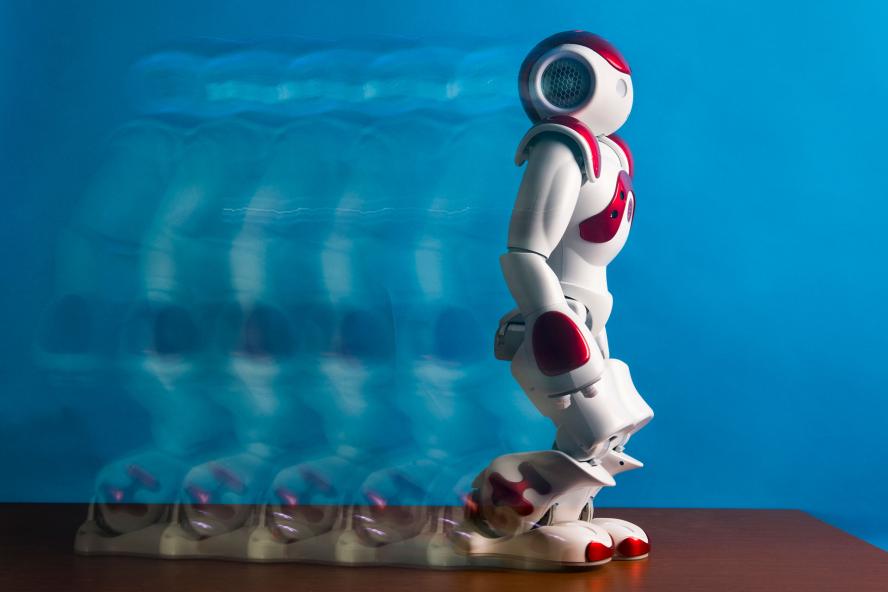Human-Robot Interaction
Spring: Sep 15
Summer: n/a
Part-time (Daytime)
Overview
Human-robot interaction cuts across the engineering and social sciences, offering a paradigmatic interdisciplinary program with enormous future societal benefits—especially as intelligent autonomous robots increasingly become part of our lives. The future of artificial intelligence (AI) will be shaped by students with inquisitive minds willing to draw upon knowledge from multiple fields to help define the role of robots in the social and moral norms that govern human lives.
Program Highlights
The Tufts human-robot interaction program is distinguished by its opportunities to work closely with faculty every step of the way. Graduate students have the chance to collaborate with and learn from some of the most renowned experts in the country, all while seamlessly transitioning from graduate studies to a full-time career or a doctoral program.
The program is offered through three departments: computer science, electrical and computer engineering, and mechanical engineering. Students in each department share a set of five required core courses, then focus on classes approved by their respective department. Learn about topics ranging from affective interfaces to digital signal processing to collaborative robotics.
There’s no better place to earn your human-robot interaction degree than in a hub for modern technology. Tufts is only a short subway ride from downtown Boston and Cambridge—well-known centers for leading technology research and development.
Students in each department share a set of five required core courses, but other requirements vary.
- MS in Computer Science: Human-Robot Interaction
- MS in Electrical and Computer Engineering: Human-Robot Interaction
- MS in Mechanical Engineering: Human-Robot Interaction
Graduate Cooperative Education (Co-Op) Program
The School of Engineering's Graduate Cooperative Education (Co-Op) Program provides students with the opportunity to apply the theoretical principles they have learned in their coursework to real-world engineering projects. Gain up to six months of full-time work experience, build your resume, and develop a competitive advantage for post-graduation employment. Learn more about the Co-Op Program.
Program Outcomes
As AI continues to develop and take on new roles in our lives, those with a degree in human-robot interaction will be in increasing demand. The future of AI is bright and holds much promise—to achieve all that’s possible with robots, we’ll need skilled engineers with hands-on experience researching, developing, and applying the principles of robotics and machine learning to projects big and small. With a degree from Tufts, you’ll be situated at the forefront of AI growth.
Careers for graduates include:
- Robotics scientist
- AI research scientist
- Machine learning engineer
- Data scientist
- Business intelligence developer
- Software developer
Meet the people who can help you jump-start your career in human-robot interaction. You’ll be able to cultivate your passions in a dynamic and supportive environment. And with so many of our professors bringing their professional practice into the classroom, you’ll have direct access to their networks after graduation.
Application Requirements
The Department of Computer Science, the Department of Electrical and Computer Engineering, and the Department of Mechanical Engineering all offer an MS in Human-Robot Interaction. These options are listed in the graduate admissions application.
- Application Fee
- Resume/CV
- Personal Statement
- Transcripts
- Three letters of Recommendation
- Official GRE scores (if applicable)
- GRE General Test scores not required for applicants who will have received a degree from an institution located in the U.S. or Canada by time of enrollment. GRE scores required for all other applicants.
- Official TOEFL, IELTS, or Duolingo test scores (if applicable)
- Computer Science considers a TOEFL score of 100, IELTS score of 7.5, or Duolingo score of 120 to be competitive for admittance. See the Computer Science Master's page for a listing of specific subcategory scores
- Mechanical Engineering considers a TOEFL score of 100, IELTS score of 7.5, or Duolingo score of 120 to be competitive for admittance
- The remaining tracks follow the standard guidelines found on our International Student Requirements page
- Portfolio (optional)
Tuition and Financial Aid
We recognize that attending graduate school involves a significant financial investment. Our team is here to answer your questions about tuition rates and scholarship opportunities.
Please contact us at gradadmissions@tufts.edu.
Career Outcomes

Average Salary: $145K+
Projected Job Growth (2022-2032): 23%
*Sources: Average salary and projected job growth statistics are from the U.S. Bureau of Labor Statistics Occupational Outlook Handbook. The listed salary is for computer and information research scientists. Human-Robot Interaction salaries may differ.
Faculty

Matthias Scheutz

Matthias Scheutz
Research/Areas of Interest: Artificial intelligence, artificial life, cognitive modeling, foundations of cognitive science, human-robot interaction, multi-scale agent-based models, natural language understanding.

Jason Rife

Jason Rife
Research/Areas of Interest: navigation, safety-critical transportation systems, state estimation, human-robot interaction

Usman Khan

Usman Khan
Research/Areas of Interest: Optimization and Control, Machine Learning, Signal Processing, Graph Theory, Decentralized Algorithms

Shuchin Aeron

Shuchin Aeron
Research/Areas of Interest: data science, statistical signal processing, inverse problems, compressed sensing, information theory, convex optimization, machine learning, algorithms for geophysical signal processing, compressed sensing architectures and evaluation, video and image data acquisition and processing

J.P. de Ruiter

J.P. de Ruiter
Research/Areas of Interest: Cognition and Psycholinguistics

Robert Jacob

Robert Jacob
Research/Areas of Interest: human-computer interaction, new interaction modes and techniques, implicit brain-computer interfaces, user interface software

Karen Panetta

Karen Panetta
Research/Areas of Interest: Signal processing; image processing; simulation modeling

Chris Rogers

Chris Rogers
Research/Areas of Interest: Engineering Education, Human Robot Interaction, Mechanical Engineering, Music Engineering, Artificial Intelligence and Image Processing

Elaine Short

Elaine Short
Research/Areas of Interest: human-robot interaction, accessibility, robotics, human-in-the-loop machine learning, assistive technology Applying human-centered design and disability community values to the development, deployment, and evaluation of AI and machine learning for robotics, including: human-centered human-in-the-loop machine learning; disability-friendly assistive robotics; autonomous HRI in groups, public spaces, and other human-human contexts; and accessibility and disability inclusion in robotics education and the computing research community.

Jivko Sinapov

Jivko Sinapov
Research/Areas of Interest: Artificial Intelligence, Developmental Robotics, Computational Perception, Robotic Manipulation, Machine Learning, Human-Robot and Human-Computer Interaction

Robert White

Robert White
Research/Areas of Interest: Microelectromechanical Systems (MEMS) fabrication, modeling, and testing. Particularly acoustic MEMS (microphones, ultrasound), and aerodynamic measurement technologies (skin friction sensors, aeroacoustic sensors). Acoustics, vibrations, dynamics and controls. Electromechanical systems including robotics. Finite element methods and system modeling. Electronics for measurement. Mechanical measurements.